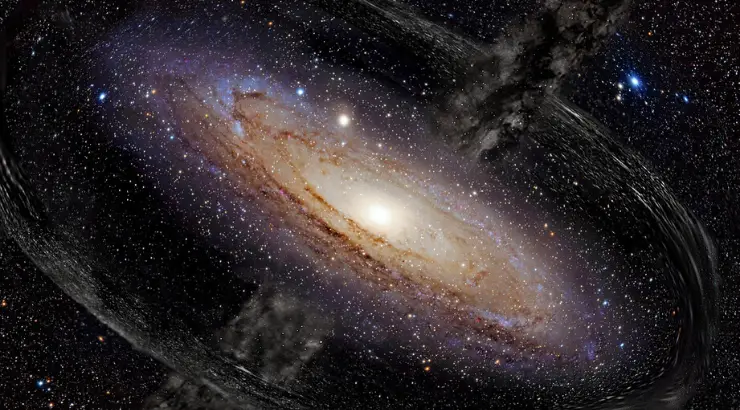Science & Tech
Our Understanding of Dark Matter is Very Wrong, Physicist Suggests
Forget everything you thought you knew about dark matter.

(TMU) — Physicists, astronomers, and cosmologists alike have remained confounded by the mystery of dark matter for decades. A stunning new hypothesis proposes that this nebulous missing component of the universe doesn’t even exist and that the elusive fifth form of matter is actually information.
The conundrum of dark matter has plagued scientists for over half a century. Formulated in an effort to explain early scientific discrepancies in the speed of galaxy rotation, which ultimately revealed galaxies contain a significant amount of unexplained mass that can’t be detected, dark matter has since been estimated to comprise 27% of the known universe.
Not only have scientists believe dark matter constitutes a significant amount of the mass of galaxies, but it has also been thought to be utterly critical to the creation and stability of galaxies. Without dark matter, galaxies would fly apart. The gravity caused by dark matter, in other words, holds the stars together in their characteristic galactic shape.
Life in the universe, scientists believed, is predicated on the structural stability of dark matter.
Theories for what dark matter actually is have ranged from theoretical particles such as the neutral axion and the uncharged photino to MACHOs (Massive Compact Halo Objects) like black holes, supermassive black holes, brown dwarfs, and neutron stars and a difficult-to-detect non-baryonic matter known as WIMPS (Weakly Interacting Massive Particles).
In a new paper published in the journal AIP Advances, Dr. Melvin Vopson of the University of Portsmouth in the UK has advanced perhaps the most radical explanation yet. He posits that dark matter is a red herring—it doesn’t exist. Instead, his hypothesis called the “mass-energy-information equivalence,” suggests information is a “fundamental building block of the universe” and, furthermore, contains actual mass, energy, and gravitational influence.
In describing the mathematics of his hypothesis Vopson writes:
“I am the first to propose the mechanism and the physics by which information acquires mass, as well as to formulate this powerful principle and to propose a possible experiment to test it.”
As to the connection with dark matter, he writes, “M.P. Gough published an article in 2008 in which he worked out … the number of bits of information that the visible universe would contain to make up all the missing dark matter. It appears that my estimates of information bit content of the universe are very close to his estimates.“
The mechanism he invokes is a hybridization of special relativity and the Landauer Principle.
While this may sound outlandish, the core of his idea originates with Classical Information Theory. The concept of information being the core unit of universal reality is not new and in fact legendary scientist-philosopher John Archibald Wheeler, who worked alongside Einstein and is widely regarded as one of the most influential physicists in history, coined the phrase “it from bit,” by which he suggested that everything in the universe results directly from information.
In his later years, Wheeler focused on the bigger questions raised by quantum theory and ended up going down a rabbit hole of an idea he called “the participatory universe,” or “Participatory Anthropic Principle” (PAP). Wheeler suggested that reality is created by conscious observers.
Whether there is a unifying scientific principle—a Theory of Everything—that can connect quantum physics, relativity, and something like the participatory universe is one of the big haunting mysteries in modern science. Vopson’s idea that information is the missing fifth form of matter that holds galaxies together is a tantalizing new chapter in this quest.
Vopson is currently applying for grants to build an “international consortium” to test his hypothesis with laboratory experiments.
By Jake Anderson | Creative Commons | TheMindUnleashed.com
Typos, corrections and/or news tips? Email us at Contact@TheMindUnleashed.com
